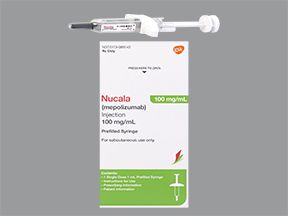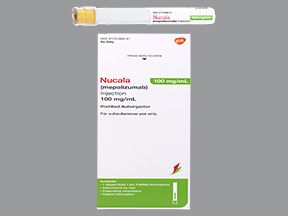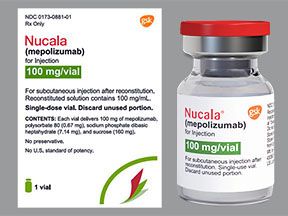Nucala (mepolizumab) is a brand-name drug prescribed for conditions related to high eosinophil levels in adults and some children. It’s given as a subcutaneous injection by you or a healthcare professional, typically every 4 weeks.
Nucala is a biologic and belongs to a drug class called interleukin blockers. Nucala isn’t available in a biosimilar version.
Keep reading for specific information about the dosage of Nucala, including its strengths and how the medication is given. For a comprehensive look at Nucala, including details about its uses, see this article.
Note: This article describes typical dosages for Nucala provided by the drug’s manufacturer. However, your doctor will prescribe the Nucala dosage that’s right for you.
Below is information about Nucala’s dosage for its approved uses.
Nucala forms and strengths
Nucala comes in the following forms and strengths for subcutaneous injection:
- Powder inside single-dose vials. A healthcare professional mixes the powder with a liquid to form a solution for injection. It comes in one strength:
- 100 milligrams (mg)
- Liquid solution for injection in a single-dose prefilled syringe.* It comes in two strengths:
- 40 mg per 0.4 milliliter (mg/mL)
- 100 mg/mL
- Liquid solution for injection in a prefilled autoinjector pen.* It comes in one strength:
- 100 mg/mL
* Your doctor will prescribe this form of Nucala if you self-inject the drug. To learn more, see the “How Nucala is given” section below.
Typical dosages
Typically, Nucala is given once every 4 weeks. You’ll go to your doctor’s office for the injections or learn to self-inject at home. Your dosage will depend on the condition you’re taking the drug to treat.
The following information describes dosages that are commonly prescribed or recommended in adults. However, be sure to take the dosage your doctor prescribes for you. Your doctor will determine the best dosage to fit your needs.
Dosage for severe eosinophilic asthma
Nucala treats severe eosinophilic asthma. The recommended adult dosage is 100 mg once every 4 weeks.
Note: For this use, Nucala is an add-on treatment. This means you take your other asthma medications along with Nucala.
Dosage for eosinophilic granulomatosis with polyangiitis
Nucala treats eosinophilic granulomatosis with polyangiitis (also known as Churg-Strauss syndrome). The recommended adult dosage is 300 mg once every 4 weeks, given as three 100-mg injections.
Dosage for hypereosinophilic syndrome
Nucala treats hypereosinophilic syndrome (a blood condition marked by high eosinophil levels). The recommended adult dosage is 300 mg once every 4 weeks, given as three 100-mg injections.
Note: Nucala is approved to treat hypereosinophilic syndrome that has been present for 6 months or longer with no known cause.
Dosage for chronic rhinosinusitis with nasal polyps
Nucala treats chronic rhinosinusitis with nasal polyps. The recommended adult dosage is 100 mg once every 4 weeks.
Note: Nucala is approved for this use in adults who received treatment for nasal polyps in the past. It’s an add-on treatment, so you take your other medications along with Nucala.
Children’s dosage
Below are the typical dosages for the conditions that Nucala is approved to treat in children. Your child’s doctor will give their doses by subcutaneous injection. In some cases, you may give the doses to your child after their doctor shows you how. To learn more, see the “How Nucala is given” section below.
Dosage for severe eosinophilic asthma
Nucala treats severe eosinophilic asthma in children ages 6 years and older. The recommended dosage depends on your child’s age as follows:
- 6–11 years: 40 mg once every 4 weeks
- 12 years and older: 100 mg once every 4 weeks
Note: For this use, Nucala is an add-on treatment. This means your child will take their other asthma medications along with Nucala.
Dosage for hypereosinophilic syndrome
Nucala treats hypereosinophilic syndrome in children ages 12 years and older. The recommended dosage is 300 mg once every 4 weeks, given as three 100-mg injections.
Note: Nucala is approved to treat hypereosinophilic syndrome that has been present for 6 months or longer with no known cause.
Long-term treatment
Nucala is meant to be a long-term treatment. If you and your doctor determine that Nucala is safe and effective for you, you’ll likely continue treatment long term.
If you have questions about your treatment plan, talk with your doctor for more information.
The Nucala dosage your doctor prescribes will depend on several factors. These include:
- the type and severity of the condition you’re using Nucala to treat
- the form of Nucala your doctor prescribes
- your age
- other medical conditions you may have
Nucala comes in three forms for subcutaneous injection. You’ll receive your Nucala doses at your doctor’s office or give them yourself at home. If you’re self-injecting the drug, your doctor will prescribe prefilled syringes or autoinjectors. They’ll show you how to use them.
Nucala injections are given under the skin of your thigh, abdomen, or upper arm.
Some Nucala doses involve more than one injection every 4 weeks. For example, a dose of 300 milligrams (mg) requires three 100-mg injections, one after the other.
Before giving an injection, remember to:
- Remove the syringe or autoinjector from the refrigerator 30 minutes beforehand.
- Make sure the solution is clear, colorless, and doesn’t have particles floating in it.
- Avoid injecting under skin that’s discolored, bruised, hard, or tender.
- If you’re giving more than one injection, space them at least 2 inches (in) apart.
To learn more, you can read the instructions for the prefilled syringe and prefilled autoinjector pen. You can also refer to the manufacturer’s website or call the MyNUCALA Support Line at 1-844-4-NUCALA or 844-468-2252.
ACCESSIBLE DRUG LABELS AND CONTAINERSSome pharmacies offer labels with large print, braille, or a code you scan with a smartphone to convert text to speech. If your local pharmacy doesn’t have these options, your doctor or pharmacist might be able to recommend a pharmacy that does.
If you self-inject Nucala and you miss a dose, give your dose as soon as you remember. Then continue with your usual dosing schedule. For details, see the “Nucala dosage” section above. If you have questions about a missed dose, talk with your doctor or pharmacist.
If you miss an appointment for your Nucala injection, call your doctor’s office as soon as possible. They’ll reschedule it according to your doctor’s instructions.
To help make sure that you don’t miss a dose, try using a medication reminder. This can include setting an alarm on your phone. You could also put a note where you’ll see it, such as on your bathroom mirror or bedside table.
If you self-inject Nucala, it’s important that you do not use more Nucala than your doctor prescribes. For some medications, using more than the recommended amount may lead to harmful effects or overdose. For details about Nucala’s side effects, see this article.
If you use more than the recommended amount of Nucala
Call your doctor right away if you believe you’ve used too much Nucala. Another option is to call America’s Poison Centers at 800-222-1222 or use its online tool. If you have severe symptoms, immediately call 911 or your local emergency number, or go to the nearest emergency room.
Below are some commonly asked questions about Nucala’s dosage.
If my Nucala dose (300 mg) requires three injections, can I space them out over several days?
No, you cannot space your Nucala injections over several days. For a 300-milligrams (mg) dose, you receive (or give yourself) three 100-mg subcutaneous injections, one right after the other. To learn more, see the “How Nucala is given” section above.
If you have questions about your Nucala injections, talk with your doctor to learn more.
Can I receive my Nucala injection more often than once every 4 weeks?
No, it’s not recommended to get a Nucala injection more often than once every 4 weeks. (Nucala is given by subcutaneous injection.) If you have concerns about whether your Nucala dosage is managing your symptoms, talk with your doctor. They can also discuss the frequency of your injections.
The dosages in this article are typical dosages provided by the drug manufacturer. If your doctor recommends Nucala for you, they’ll prescribe the dosage that’s right for you. If you self-inject the drug, always follow the dosage your doctor prescribes.
As with any drug, never change your dosage of Nucala without your doctor’s recommendation. If you have questions about the dosage of Nucala that’s best for you, talk with your doctor.
Besides learning about dosage, you may want other information about Nucala. These additional articles might be helpful:
- More about Nucala. For information about other aspects of Nucala, refer to this article.
- Side effects. To learn about side effects of Nucala, see this article. You can also look at the Nucala prescribing information.
- Drug comparison. Find out how Nucala compares with Fasenra and Xolair.
- Cost. If you’d like information about Nucala and cost, see this article.
- Details about your condition. For more information about your condition, see our asthma and allergies hub.
Disclaimer: Medical News Today has made every effort to make certain that all information is factually correct, comprehensive, and up to date. However, this article should not be used as a substitute for the knowledge and expertise of a licensed healthcare professional. You should always consult your doctor or another healthcare professional before taking any medication. The drug information contained herein is subject to change and is not intended to cover all possible uses, directions, precautions, warnings, drug interactions, allergic reactions, or adverse effects. The absence of warnings or other information for a given drug does not indicate that the drug or drug combination is safe, effective, or appropriate for all patients or all specific uses.



